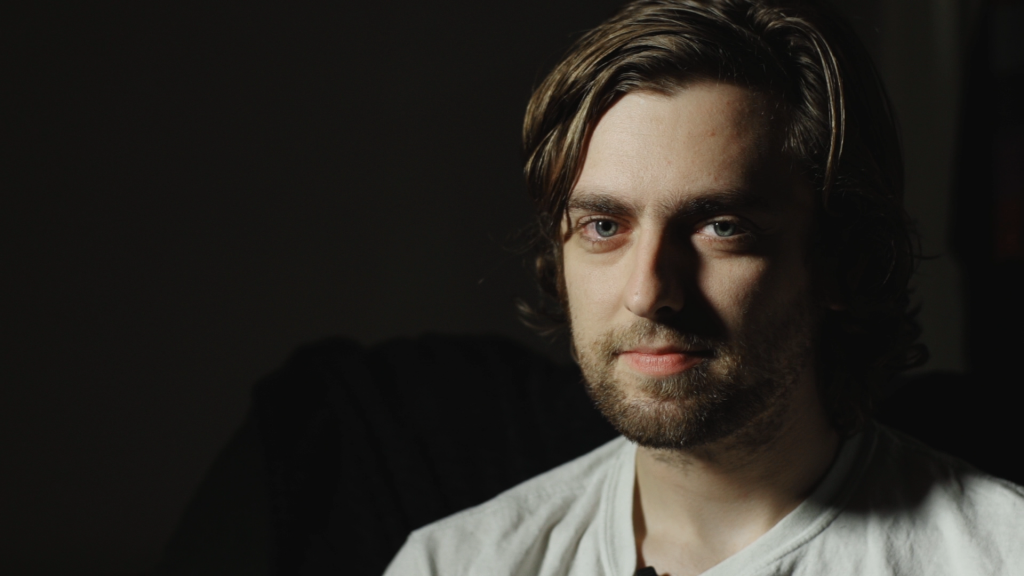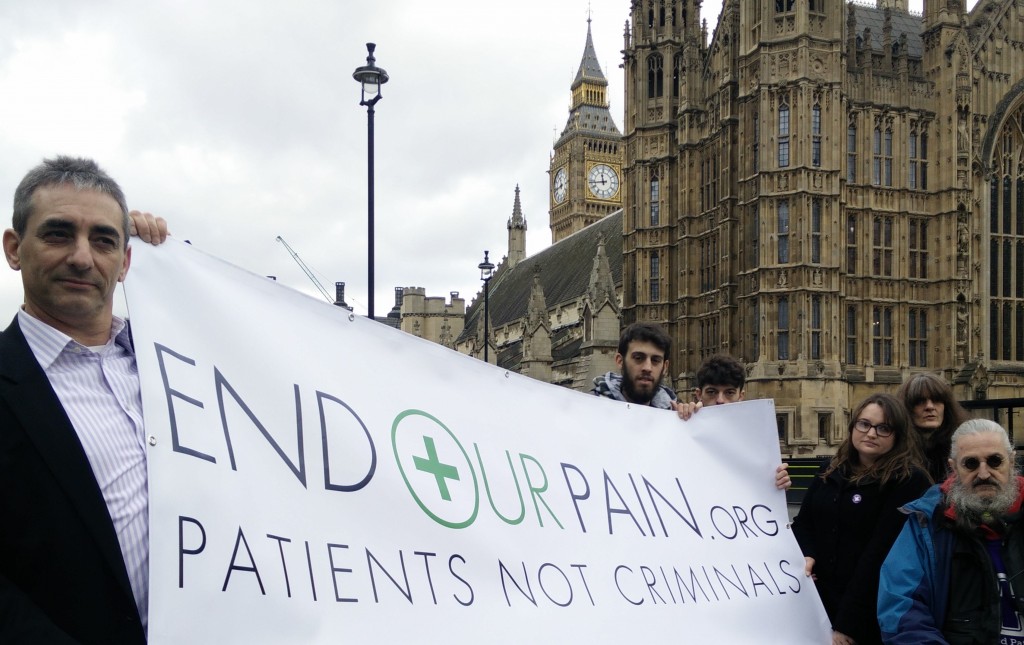Call it a ‘movement’, call it a ‘community’, whatever you call them, you can’t deny that activists campaigning for cannabis legalisation in the UK aren’t putting the hours in behind the scenes.
Indeed, while political turmoil bubbles on, those committed to a cause, those quite often motivated by the demands of their circumstances, in this case the need for patients to access medicinal cannabis, can’t afford to take a day off. Hence, a disparate group of activists has emerged – struggling valiantly along in the background, hoping to swing hearts and minds wherever they can.
Earlier this month, we met one of the UK’s foremost activists for cannabis law reform, Clark French, who is one of the subjects of the forthcoming documentary Grassroots – The Cannabis Revolution. During our chat, French spoke about his campaigning history, and offered his perspective on the path ahead.
VolteFace: How did you get started in campaigning for cannabis law reform in the UK, and what exactly helped you make the transition into advocacy?
Clark French: It’s funny, I can pinpoint the exact moment things changed – and it was only a Facebook post.
I posted a picture in public on my Facebook page of a red cross with a cannabis leaf on it, saying ‘Medicinal Cannabis Saves Lives’ – Doing so, I said to myself ‘that’s it: i’m publicly declaring what I believe in, and, I am going on record as a medicinal cannabis patient.’
When I was first diagnosed with MS, I was really keen to do something to help. I was often quite ill and therefore not able to work a lot of the time, but I wanted to do something that would give my life meaning. So i did lots of charity work – on behalf of the a local MS charity – to raise awareness.
I went on BBC Radio Berkshire and they asked me what I did to manage my symptoms, and I answered honestly: that I consume cannabis medicinally and it that’s how I managed. I was on track to become the youngest ever trustee of an MS charity, but after my radio interview, the charity didn’t want anything more to do with me. It was very frustrating as the charity had told me that there were other MS patients out there who were self-medicating with cannabis. I had also seen my step-father, who also has MS, medicate using cannabis – so I knew I wasn’t alone there.
Soon after the MS charity, I got involved with the Legalise Cannabis Alliance (now known as CLEAR). After that I worked with NORML & the UK Cannabis Social Club network. I later went on to establish the United Patients Alliance.
When you set up the United Patients Alliance, did you take anything from your experience with the MS Trust as you went about campaigning for a social cause?
Definitely, to some extent. I learned a lot in terms of how to run an organisation, and what sort of roles and responsibilities people in charitable organisations have, and it set me up for what was to come with the UPA – even though we were set up initially to be more of a platform for patients to get their voices heard by politicians and the public, rather than a charity.
As the UPA has developed, you have gone beyond attracting medicinal cannabis patients looking for support, and are now starting to draw attention from policymakers. What can you tell us about End Our Pain?
I was initially quite skeptical about End Our Pain, after I first heard about it. Many amongst the cannabis community felt that its goals didn’t go far enough – and compromised our initial ‘game-plan’ [campaigning for the patient’s right to grow their own medicinal cannabis at home].
I think it is really important to have an ‘After EOP’ is because EOP’s advocacy is very narrow. It’s that way obviously because its targets are achievable, but we still need a bigger picture for campaigning.
People were worried initially, but we are seeing EOP do some great work – gaining signatures, and spreading awareness – so perceptions are shifting. They’ve upped the game, but the [cannabis activist] community are apprehensive around professional campaigners, and as such they are wary that it will lead to ‘corporate cannabis’, potentially threatening access to some cannabis consumers. But they don’t need to be!
What do you think about the existing ‘corporate cannabis’ markets in the US such as Colorado – do those activists wary of EOP have cause for concern?
There need to be a variety of avenues through which cannabis can be prescribed to patients, but, if you think that there is absolutely no way that big business will get involved (in legal or medicinal cannabis), then you are deluded. They are involved whether we like it or not – and money talks.
So if we want our voices to be heard, then we need to be talking to these people. We don’t need to be demonising them, making them out to be something that they are not. Ultimately, we live in a capitalist world. This is life. This is the situation. You have to adapt to that, otherwise we will not be heard at all. We’ll get steamrolled. We will get nothing.
When medicinal cannabis comes to the UK, we are probably not going to get every single thing we want straight away. But that doesn’t mean the battle is over. That does’t mean we stop fighting. We aren’t there yet – but we are getting closer, and I can approve EOP as they are helping us get closer.
What is the APPG, and what is it’s significance?
It is really important that we have a number of MP’s talking about the issue of cannabis legalisation, and this can help us spread awareness of the issue in the media. Is the APPG report going to legalise medicinal cannabis in the UK? Probably not, but it will take us in that direction.
The best thing about it is the information we will get from medicinal cannabis patient testimonies. We are going to get a large amount of information about the methods of consumption, and accessing cannabis that patients use across the country. The general public will get a much more accurate and honest representation of what it means to be a medicinal cannabis patient.
[Editor’s note: The APPG findings have now been provisionally scheduled for publication on the 13th September]
Lastly, could you share a little bit about the forthcoming documentary GrassRoots – The Cannabis Revolution?
The film is directed by Dale Beaumont-Brown, who is actually a cousin of mine. About 4 years ago, having committed myself to activism for about 2 years at this point. I knew Dale was, at that time, making a documentary on AIDS patients in Europe, and the different medications available to them.
So I sent Dale a message telling him ‘look – this is what I do now, i’m involved with these various [cannabis advocacy] organisations – there’s a documentary in this’. Dale agreed and set about following campaigners and filming them for the documentary.
What is exciting is that you are going to see [with Grassroots] the transition from ‘grassroots’ campaigning to something more professional – Dale really documented that.
It’s called ‘The Cannabis Revolution’, and some people find that title a little misleading – but it turns out that the ‘revolution’ is not the law [legalising cannabis in the UK] but the ‘revolution’ is the activism itself, and the activists are evolving. It is a revolution, just not in the way it’s made out to be.
It’ll be screening at a handful of film festivals here and there – we are still waiting on all the details to be confirmed, and it will of course be available online eventually.
In the meantime, watch the trailer for ‘GrassRoots – The Cannabis Revolution’ below.
Clark French is the Director of the United Patients Alliance. Tweets @Clarkfrenchuk
Interview and words by Calum Armstrong tweets @vf_calum


